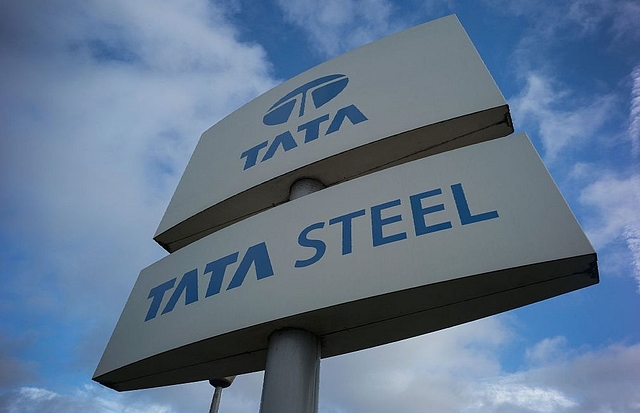Business
Failure Of Tata Steel-Thyssenkrupp Deal Highlights Group’s Need To Abandon Conglomerate Thinking
- Conglomerate thinking is not helping the Tatas.
- It is high time the Tatas told their key businesses to fend for themselves.

Tata Steel. (Christopher Furlong/Getty Images)
The collapse of Tata Steel Europe’s proposed 50:50 joint venture with Thyssenkrupp should raise question-marks, once again, about the kind of debt-fuelled acquisitions strategy that has brought much grief to the group in the past decade. Worse, it is handicapping the one company in the group that could easily soar into the global stratosphere: Tata Consultancy Services (TCS).
The group made three gigantic bets in the Noughties (the previous decade) – two abroad and one at home – and all of them have come a cropper.
In 2007, the group brought Corus Steel of the UK for $13.1 billion at the peak of the steel cycle, but the 2008 global financial crises killed off that boom, leaving the group with huge debts. Post the arrival of N Chandrasekharan as Tata Sons chairman, the group has been trying to wind down these bets. The joint venture with Thyssenkrupp was one part of the attempt to reduce Tata Steel’s debts of over Rs 108,000 crore, and the collapse of the deal means that other assets will have to be sold to reduce debts. A fresh call on TCS – more TCS share sales by Tata Sons – may be attempted to pump more resources into Tata Steel. But it would be a terrible idea.
In 2008, Ratan Tata, then group chairman, bought Jaguar Land Rover (JLR) for a net $2.3 billion, and for a while, as the Chinese market boomed, JLR looked like a great bargain buy. But in the December 2018 quarter, Tata Motors shocked the market by reporting the biggest ever loss by an Indian company – $3.8 billion in one quarter, and almost all of it due to JLR’s sales collapse in global markets, especially China.
Again in 2018, thanks to the entry of Reliance Jio, Tata Teleservices made a hasty exit by selling its telecom businesses for a song to Airtel. The entire investment of Rs 28,000 crore has had to be written off.
Even as the group’s problems bloated, it has been selling TCS shares to fund its ambitions (the bid for Bhushan Steel, for example) or pay for its past mistakes. In March 2018, Tata Sons sold Rs 9,000 crore worth of TCS shares for investing in group companies. In August 2018, it said it would sell another Rs 11,500 crore worth of TCS shares in the company’s buyback programme.
At last count, Tata Sons had around 72 per cent in TCS, and one can assume that this stake will come down further as more of the group’s losses need funding, whether at Tata Steel or Tata Motors or elsewhere.
It is a fundamental rule in business that you starve your losers and feed your winners. The Tata Group, thanks to its emotional investment in companies considered core to the group’s identity, is actually doing the opposite: denuding its strongest company of resources to fund its losers.
This is not to say that Tata Steel or Tata Motors are perennial losers, but these companies need to find ways to slim down and become profitable without having to dip into TCS’s resources for growth.
As a company with enormous cash resources, one can assume that TCS can afford to fund the group for some more time. But the more important question to ask is whether you should be using your surpluses to grow your own high-margin businesses or your dicier ones?
This latter is as daft as Vijay Mallya using resources from his profitable liquor businesses to fund a low-margin and losing airline business like Kingfisher.
Conglomerate thinking sucks you into these follies. It is high time the Tatas told their key businesses to fend for themselves, and allow TCS to find its own higher growth path, if needed by acquisitions that will involve dilution of its own capital.
Diluting the Tata stake for growth in the high-potential IT services and consulting businesses is an investment in even higher growth; diluting it to pare debts in Tata Steel or Tata Motors is a lose-lose strategy.
Support Swarajya's 50 Ground Reports Project & Sponsor A Story
Every general election Swarajya does a 50 ground reports project.
Aimed only at serious readers and those who appreciate the nuances of political undercurrents, the project provides a sense of India's electoral landscape. As you know, these reports are produced after considerable investment of travel, time and effort on the ground.
This time too we've kicked off the project in style and have covered over 30 constituencies already. If you're someone who appreciates such work and have enjoyed our coverage please consider sponsoring a ground report for just Rs 2999 to Rs 19,999 - it goes a long way in helping us produce more quality reportage.
You can also back this project by becoming a subscriber for as little as Rs 999 - so do click on this links and choose a plan that suits you and back us.
Click below to contribute.
Latest